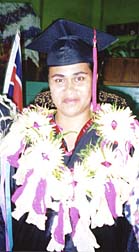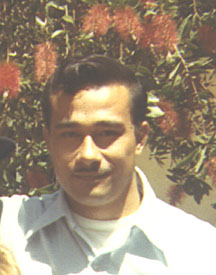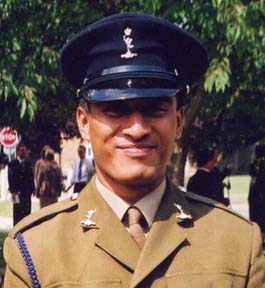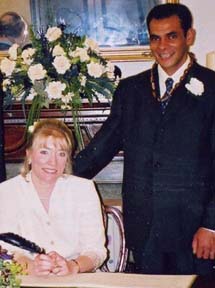|
| From Assistant Minister Marieta Rigamoto in Suva (7 January 2003, posted 23 January) I was in Rotuma from 16-18 December 2002 and was able to attend the celebration for Chief Justice, Daniel Fatiaki, which was hosted by the Council of Rotuma. Hon J. Vosanibola, Minister for Civil Aviation and Transport and Hon. Kenneth Zinck, Minister for labour and Industrial Relations were also in Rotuma and attended the celebrations. While in Rotuma the Ministers visited the airport and proposals are now being formulated for tarsealing of the airstrip, hopefully in 2004, and the provision of a fire tender will be in place by mid 2003. The Minister for Labour, who is responsible for occupational health and safety (OHS) visited the hospital, PWD, Council garages, and schools in Rotuma during the trip. Plans are also in place for improvement of these facilities by March 2003. During the visit Hon. Kenneth Zinck donated 35 new desks and chairs for the Christ the King Primary School in Sumi. Miss Jane Erasito, a dedicated mother, nursing sister, and community worker passed away on 25 December 2002. She was laid to rest on Friday 27 December. From Lory Leacock in Fiji (22 January 2003)
Susau Fatiaki graduated from the South Pacific Bible College (Assemblies of God) on December 6, 2002. Susau won the highest honor, the President's Award, for being the outstanding graduating student. Her husband, Vamarasi, graduated from the same college
in December of 2001. Vamarasi was on staff at the college
while Susau was finishing up her last year of college.
From the Guam Pacific Daily News Website (17 January 2003) Two articles concerning Mekeli Wesley appeared in the Guam PDN newspaper today. Mekeli is the son of Hiagi and Susan Wesley who now live in Orem, Utah, where Hiagi worksfor the school district. Mekeli now plays professional basketball for the Eurolines Vilvoorde team from Vilvoorde, Belgium. In the first article, he discusses his ambition to play in the NBA, America's primier basketball league. The second article is an interview with Mekeli in which he talks about his family and career. From Les Wakeham in Australia (12 January 2003) Rotuma’s stamp man turns 70 Last December, close friends and relatives of one
of Rotuma’s sons, John Antonio of Woody Point, Queensland,
Australia, gathered at his northern Brisbane residence to help celebrate
his 70th birthday. Guests included Kai Vitis and Kiwis. Born Vaviao John Elcombe Antonio at Fiji’s Colonial War Memorial Hospital in Suva, John, as he is better known, is of Rotuman parents who came from the Noa’tau and Oinafa districts. He was educated in Fiji, New Zealand, UK, and Australia, and spent most of his life in New Zealand and Australia. He holds dual citizenship (Australia and New Zealand), studied and gained academic qualifications from Auckland University. John worked as a community welfare officer, social worker, and youth worker in England, Canada, New Zealand and Australia. He previously worked as a clerk in Fiji’s PWD, New Hebrides PWD (now Vanuatu), and for the Australian Consulate in New Caledonia. John was the first indigenous person to manage the prestigious Royal Suva Yacht Club. John retired from his working career in 1988. In 1964, John suggested to the then Fiji Colonial Government to issue separate postage stamps for Rotuma to gain extra revenue, but without success. The reason given was that Rotuma was not a self-governing overseas British dependent territory, but an integral part of the colony of Fiji. John later requested the issuing of a set of commemorative stamps of Rotuman design, to mark the 175th anniversary of European discovery in 1966, but Fiji still refused to permit such stamp issues. Frustrated by the Fiji government’s lack of action, John made approaches to the then British Prime Minister at the time, Mr. Harold Wilson, for help on the commemorative stamps matter. Upon being made aware of such an important occasion, the British Prime Minister made official directives to the Fiji Colonial Government to make haste and prepare the such commemorative stamps to mark Rotuma’s special event. Hence, the issuing of Fiji’s first postage stamps of Rotuman design and the first for Rotuma to mark its European discovery by Captain Edward Edwards in 1791. The small remote island of Rotuma attracted world-wide philatelic interest and publicity which led to thousands of international mail orders for the first day covers, and the special and unique set of Fiji’s commemorative stamps of Rotuman design. These mail orders were parachute dropped by aircraft on Rotuma for postmarking and dispatching around the world. In 1989, John, as the founder and international public relations consultant of the then Overseas Rotuman Bi-Centennial Celebration Committee, asked the Fiji Government to issue another set of commemorative stamps to mark Rotuma’s bicentenary (200 years) of European discovery in 1991, and this time the Fiji Government responded co-operatively. John also organised a bicentennial exhibition held at the Fiji Museum, Suva, which had relics of the HMS Pandora on display, thanks to the co-operation of the Queensland Maritime Museum. The 70 year old great grandfather, a former political
activist of both the New Zealand Labour Party and Australian Labor
Party, is the first Fijian of Rotuman descent to be awarded the
Medal of the Order of Australia (OAM) in 1998, for his service to
the Australian community. In 1996, John was awarded the Queensland
State Government Ethnic Community Service Award for his service
to the state’s multicultural communities. From Elisapeti Inia in Suva (5 January 2003, posted 12 January) My sister Makareta's höt'ak hafu was yesterday. The day was fine and road to Veratu was good. We hung two rows of tefui round her grave plus the one round her tombstone and flowers of all colours (artificial big ones) in purple, pink, orange, yellow were laid on top of the grave. The feast afterwards was lovely. The women made chop suey, palusami, kokoda, sweet & sour pork, roast chicken, roast pork, fekei, etc., etc. I did the mamiag hafu, Deaconess Olovia said prayer and Jioje Fiu (my nephew) announced the mamiag hafu. Here in Suva, Jane Erasito passed away on Christmas day; she was buried on the 27th. Tarusila of Noa'tau, Riogi's wife passed away, and also Häe, son of Tiuhea and Ikonsi of Malhaha. At Oinafa, Sagaitu, Vira's brother who was married to Rutagrere Seforsa, Visanti Makrava's sister, also died. From High Commissioner Jioje Konrote in Canberra (11 January 2003) Sarote and I have just returned from Suva on Monday after we were invited by Government to attend a welcoming ceremony on the 20th December to commemorate the final withdrawal of our troops from Lebanon after about 24 years peacekeeping duties in that war-torn country with the United Nations. It was so good to be able to spend Christmas and New Year together with our sons who had returned earlier on after the completion of their flight training at the National Aerospace Flight Training School in Essendon, Melbourne and the Advanced Flight Theory School in Maroochydore, Brisbane. At their graduation after having qualified as commercial pilots, Emmanuel was awarded the "Most Improved Pilot Award' and young Andrew the "Quiet Achiever Award." They are presently endorsed on the following types of single and twin engine aircrafts after having to complete a Multi-Engine Command Instrument Rating training on them as well:
Emmanuel and Andrew had been accepted by Air Fiji Ltd and are now flying with the airline as First Officers. Our daughter Lisa is now back in Canberra with us and she wants to complete her computer training. From Elizabeth Benz in California (6 January 2003)
I'm here in California because my youngest brother, Jimmy, died on 5 November 2002. I arranged his memorial service, which was held on 28 November, and will be taking his ashes back to Rotuma for burial. Jimione Motofaga Gibson was born in Malhaha, Rotuma, on 6 March 1944 to Fred Gibson and Vamarasi Tamalesi. In his teens he left Rotuma to attend Lelean Memorial school in Fiji, and in December 1967 he sailed from Suva to Hawai'i to continue his education. Subsequently he settled in Santa Ana, California. Rotuma was the land of Jimione's birth and burial, but the United States of America was the land of his citizenship, the land that he loved and was so proud to belong to. From Bruce Tizard-Varcoe in England (5 January 2003)
Congratulations to Frank Alfred (son of Alfred and Theresa Joseph) and his wife Juliet on the birth of their first child, a daughter named Danielle, born on 12th November 2002.
From The Fiji Times (2 January 2003) A Difficult Road to the top for Daniel Fatiaki by Moira Vilsoni ROTUMA just had to celebrate - even though Christmas was weeks away. The appointment of Daniel Fatiaki , one of the island's famous sons, was too much to ignore. The island chiefs invited Justice Fatiaki to Rotuma and organized a homecoming ceremony for him. Justice Fatiaki succeeded Sir Timoci
Tuivaga, Fiji's first local Chief Justice. The crowd that gathered at the Ahau Government Station witnessed for the first time the bright red judiciary robes that Justice Fatiaki would wear in office. "For a small island like Rotuma, it is very hard for a person originally from this island to be recognized and be promoted to the highest legal office," said Rotuma Island Council Chairman Visanti Makrava. "And we are very proud of Justice Fatiaki's achievements as he has given the small island of Rotuma a lot of publicity with his new appointment." It was a ceremony fit for a king in its magnanimity and pomp, and the master of ceremonies described the significance of the event in his eloquent poetry.Justice Fatiaki shares the gifts of being Rotuma's "firsts" in his respective field.He has set a standard of high achievement for young Rotumans everywhere.His call to duty in the lofty office of the judiciary illustrates Rotuma's humble contributions to Fiji's development. Justice Fatiaki, who hails from a strong Catholic background, was born in 1954 in Upu, Motusa. He dedicated his success to his late father, Anselmo Fatiaki. The senior Fatiaki was one of the first few Rotumans to graduate with a Bachelors Degree. He graduated at Atmore University in Auckland before joining the family in Suva when Justice Fatiaki was in his early years in school at the Marist Brothers Primary School, Suva Street. "The only thing that I remember in Rotuma was during the Christmas party of my older brother - and that time I was only three years of age," Justice Fatiaki recalled. "The children were singing this favorite nursery rhyme and I still recall the young ones all singing their lungs out as they enjoyed the spoils from their teachers." Justice Fatiaki's father retired as a civil servant in 1976 becoming the first Rotuman Assistant Registrar at the University of the South Pacific for three years. After his retirement from USP, the senior Fatiaki and a family friend, Father Hurley, established the HART project to assist the poor and the unfortunate. "This was one of the great principles that we have got from our father - to help the poor and the unfortunate," said Justice Fatiaki Justice Fatiaki completed school at Marist Brothers High School from 1967 to 1970 before enrolling in the Foundation Programme at USP in 1971. After spending a year there, the young Fatiaki was awarded the Morris Hedstrom scholarship to study Law at the University of Auckland, following the footsteps of this father. In 1976, Justice Fatiaki graduated from Auckland University with a Law Degree. The following year, he was appointed barrister and solicitor of the High Court of New Zealand for two years. He then went ahead to become a barrister and solicitor of the Supreme Court of Fiji. He held the position for five years and was then appointed Commissioner for Oaths in Fiji. However, whilst working in the judiciary department, Justice Fatiaki was involved in extra-judiciary appointments. For 12 months, Justice Fatiaki was appointed Acting Chairman of the Fiji Law Reform Commission. He then moved to become a Member of the Management Team of the Asia-Pacific Advisory Forum on Judicial Education on Equality Issues. His other extra-judicial appointments were Chairman and National Co-ordinator of the Pacific Judicial Education Programme and the Chairman of the Fiji Law Reform Commission - Reference on Corruption, Bribery and Fraud for six months. "It was not an easy road for me and the family because there were times when I had to go away from home for a couple of months," he said. "But it was worth the sacrifice and the problems that I encountered." The biblical adage, As you sow so shall you reap, has never been truer.
|



